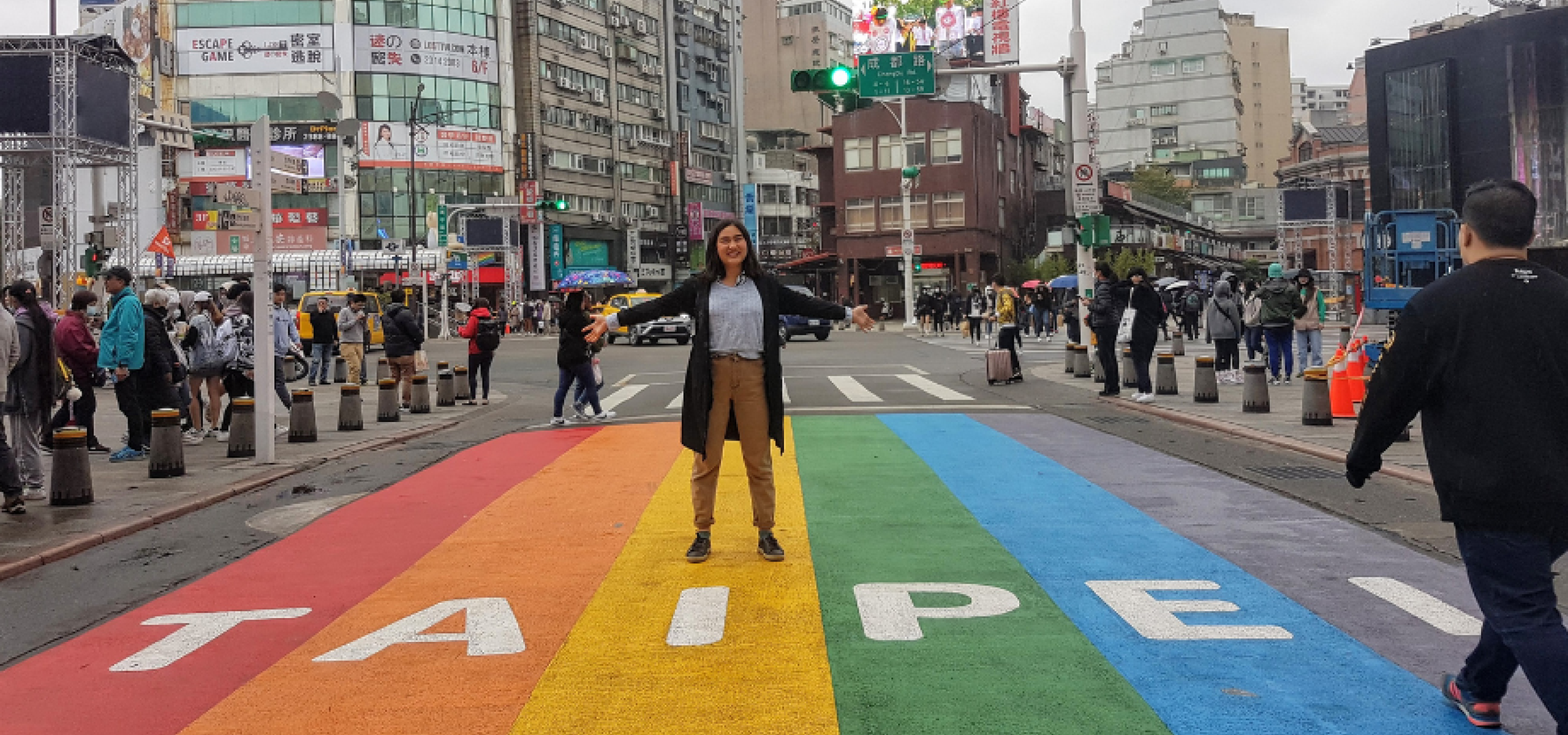
ANU Law student ambassador Cherish Tay has travelled to Taiwan to research the processes of legal power and marginalisation in the country.
My time here under the New Colombo Plan scholarship is for the explicit purpose of researching the processes of legal power and marginalisation that are alive and at work here in Taiwan.
Editor's note: Ever wondered what it’s like to study abroad? ANU Law student ambassador Cherish Tay gives us the low-down on her adventures and experiences studying in Taiwan in her new blog series.
By Cherish Tay (student ambassador)
In 2019, Taiwan became the only place in Asia were same-sex marriage is legal.
While the Same-Sex Marriage Act of Taiwan – officially the Act for Implementation of J.Y. Interpretation No. 748 (2019) – has been heralded as an inclusive reform, from the time of its implementation there has been criticism from queer advocacy groups of its exclusion of cross-border same-sex couples.
In 2020, I wrote a research paper on exactly this topic. It posed an interesting case study to investigate the personal and political impacts of using a legal framework informed by identity politics to respond to multiple axes of marginalisation, particularly of citizens of the global south from where many cross-border marriage migrants to Taiwan come.
Now, I am here in Taiwan watching developments emerge.
The primary way in which the law differentiates cross-border couples is by making the Same-Sex Marriage Act subject to the requirements in the Act Governing the Choice of Law in Civil Matters Involving Foreign Elements (2010) of which Article 46 states: “the formation of a marriage is governed by the national laws of each party”.
This means that for couples in which one person is not a citizen of Taiwan, and that person comes from a country that does not recognise same-sex marriage, a marriage in Taiwan is not valid.
While on its face this law seems to apply equally to heterosexual marriage as to same-sex marriage, in practice it discriminates, as heterosexual marriage is legal everywhere, while same-sex marriage is currently only legal in 29 countries.
Of that number, the majority are countries that have historically benefitted from colonialism, and now have high-income economies and majority-white populations. Thus, the law heralded as a victory for the LGBTIQA+ community now discriminates on the basis of nationality.
Since the Same-Sex Marriage Act passed in 2019, there have been many attempts by queer couples to appeal the foreigner exclusion clause. According to the Taiwan Alliance to Promote Civil Partnership Rights, over 400 cross-border couples are being denied marital status, a prescient issue given the separation of cross-border couples caused by COVID-19 border closures. The Alliance also produced a promotional music video featuring two famous Taiwanese singers to raise awareness on this issue.
In a few cases, the courts found case-specific loopholes to allow the couple in question to marry. Notably in a case between citizens of Taiwan and a citizen of Macau in May of last year, and a case between a Singaporean citizen and a Taiwanese citizen in November of last year.
My time here under the New Colombo Plan scholarship is for the explicit purpose of researching the processes of legal power and marginalisation that are alive and at work here in Taiwan. These are live issues in Australia as well where the valences of citizenship, and intimate relationship recognition (or lack thereof) sanctions our refugee policy.
I have many more questions than answers. Who traces these dual borderlines of geography and acceptance? And who forbids people from crossing them?
A March 2021 decision may have marked the start of something more than case-specific change. In a case concerning a Taiwanese-Malaysian couple, the Taipei Administrative High Court revoked the Household Registration Office’s denial of marital status.
In its decision, the court proposed alternative grounds on which to base the cross-border couples’ right to marry, stating that the laws of foreign states should not be applied if doing so leads to a violation of “the public order or boni mores [good morals] of the Republic of China”.
The decision also found that refusing to recognise the marriage violated the constitutional right to equal protection based on sexuality established by the Constitutional Court’s No.748 decision in 2017. In stating such, the decision relied on the equal protection of sexuality to rectify the law’s unequal treatment of nationality.
However, this is a decision of a lower court that may be overturned upon appeal. It also did not ultimately allow the couple in question to marry, further requiring the Malaysian party to provide documents evidencing that he is single.
An amendment to the Same-Sex Marriage Act addressing this problem for transnational same-sex couples was submitted to the Legislature on 22 January 2021. It proposes to lift some of the current restrictions and allow same-sex marriage to approach parity with heterosexual marriage, however it has now languished for 16 months.
In this era of hardened borders, though migration and marriage are treated as discrete bodies of law, they intersect to reproduce heteronormative power.
It remains to be seen whether the courts and legislature will be able to construct fresh legal constructs to respond to the queer social reality. I, for one, eagerly await.